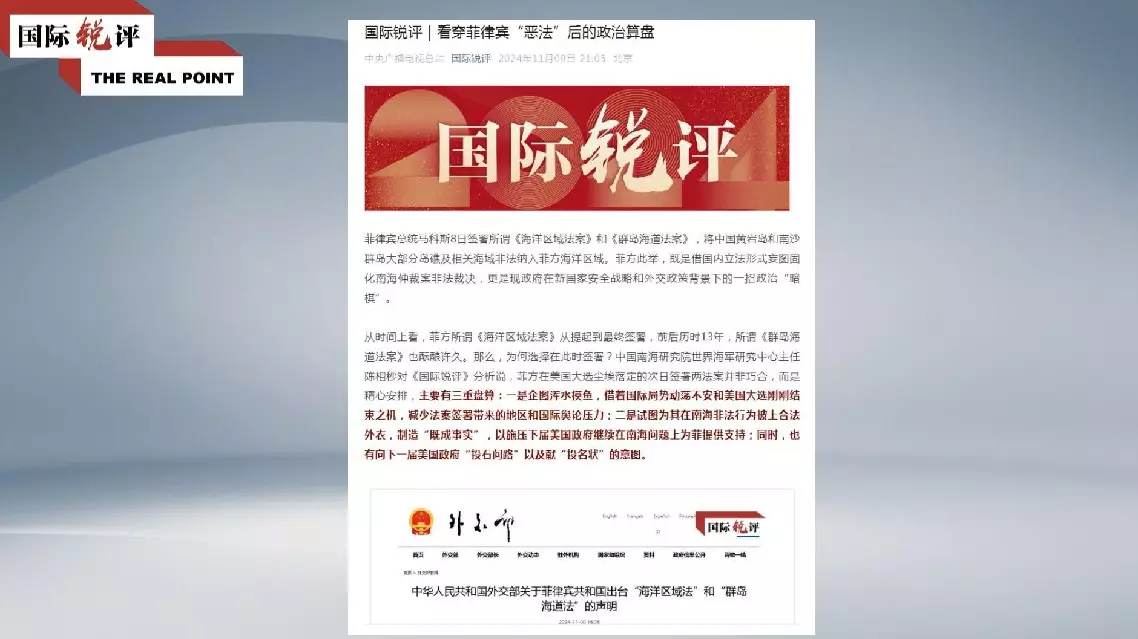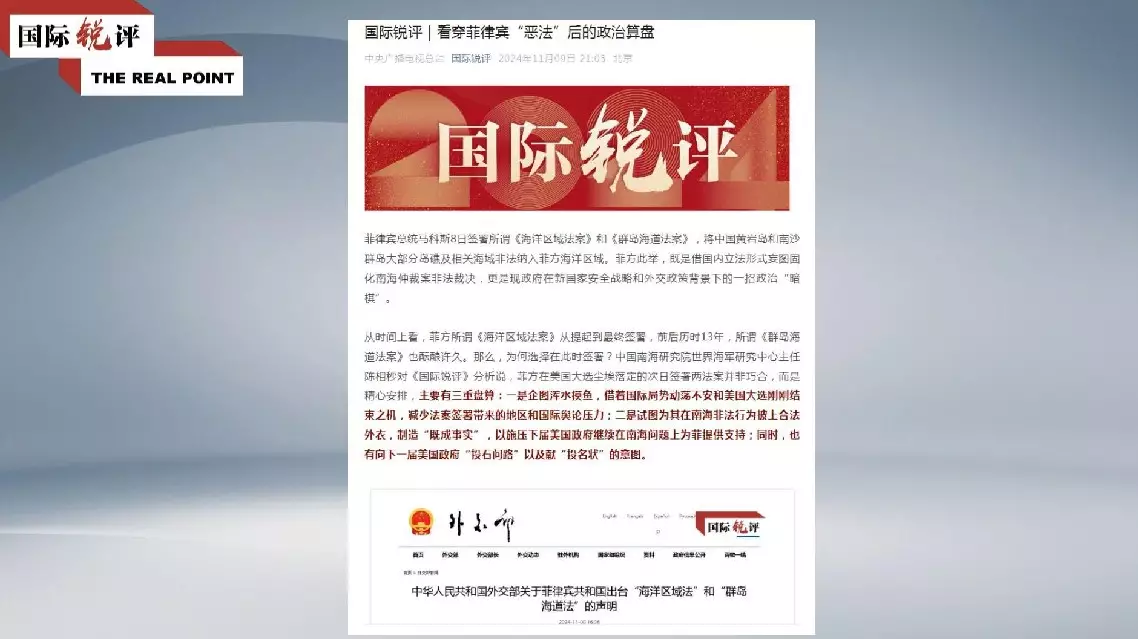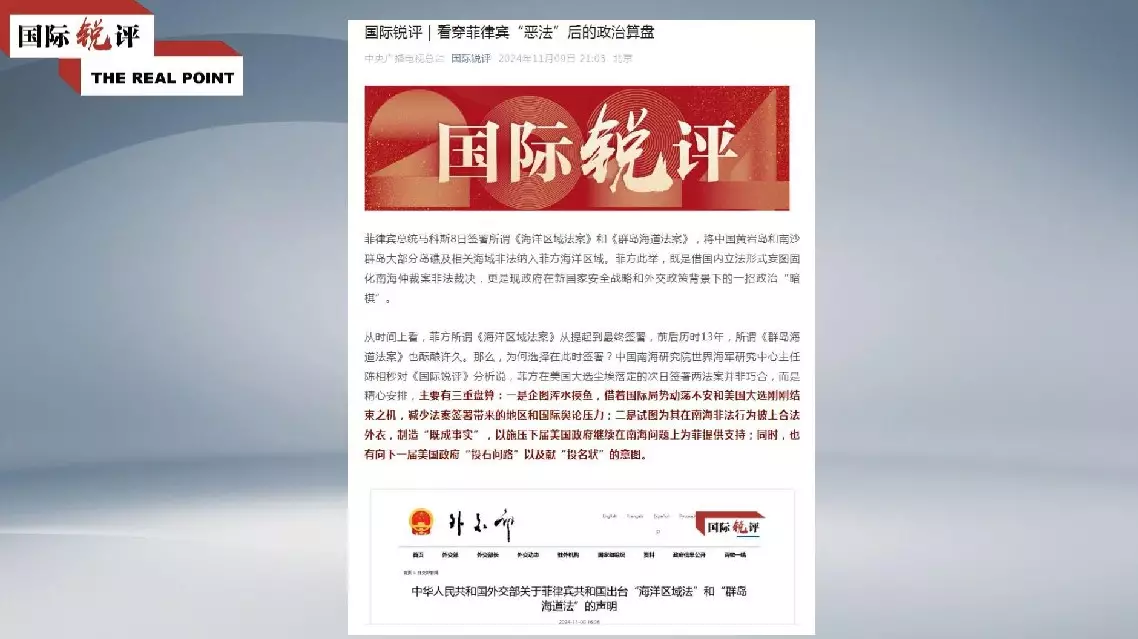The Philippines' adoption of two so-called maritime acts the day after the U.S. election is a carefully crafted plot, attempting to cover its illegal moves in the South China Sea with a legal veneer, which is bound to pose a huge impact on the situation in the South China Sea and relations among countries in the region, said a China Media Group (CMG) commentary published on Saturday.
An edited English-language version of the commentary is as follows:
On Friday, the so-called "Maritime Zones Act" and "Archipelagic Sea Lanes Act", which were signed into law by Philippine President Ferdinand Marcos Jr, illegally include China's Huangyan Dao (Huangyan Island) and most of China's Nansha Qundao (Nansha Islands) and its adjacent maritime areas into the Philippines' maritime zones.
By doing so, the Philippines attempts to further solidify the 2016 illegal arbitral award concerning the South China Sea through domestic legislation. It is also viewed as part of the secret political tricks concocted by the Philippines' incumbent government in the context of the new national security strategy and foreign policy.
Seen from the date the acts were adopted, it is not a coincidence that the Philippines signed the two acts the day after the U.S. election, but a carefully crafted plot, said Chen Xiangmiao, director of the World Navy Research Center at the National Institute for South China Sea Studies.
Chen said that there are three main calculations: First, it is trying to make profit in chaos, taking advantage of the turbulent international situation and the just-concluded U.S. election to reduce the pressure of regional and international public opinion brought about by the signing of the acts; second, it is trying to cover its illegal moves in the South China Sea with a legal veneer. It is attempting to create a "fait accompli" to pressure the next U.S. government to continue its support to the Philippines on the South China Sea issue; at the same time, it also has the intention of "throwing stones to clear its way" and offering "proof of allegiance" to the next U.S. government.
No matter how well the Philippines calculates, it will never achieve its goal.
These two acts seriously infringe on China's territorial sovereignty and maritime rights and interests in the South China Sea, violate the important principle of "resolving differences through dialogue and consultation" emphasized in the Declaration on the Conduct of Parties in the South China Sea (DOC), and undermine the existing system of international legal rules. Such acts are illegal, null and void.
First, the Philippines tried to enforce the illegal award on the so-called South China Sea arbitration through its domestic legislation "Maritime Zones Act", but it cannot change the fact that the so-called South China Sea arbitration and the award, in essence a political farce, are contrary to the United Nations Convention on the Law of the Sea (UNCLOS).
China had made those points perfectly clear long beforehand. China neither accepts nor participates in that arbitration, neither accepts nor recognizes the award, and will never accept any claim or action arising from the award. China will never accept any claim or action based on the award. China's territorial sovereignty and maritime rights and interests in the South China Sea will not be affected by the award in any way.
Second, the fantastical award claimed that the man-made facilities and "low-tide elevations" located within the so-called 200-nautical-mile exclusive economic zone belong to the Philippines. This actually goes beyond the scope of interpretation and application of the UNCLOS, and is nothing more than expanding its illegal rights and interests under the banner of the UNCLOS.
Third, the Philippines attempts to include China's Huangyan Dao and most of China's Nansha Qundao and its adjacent maritime areas into the scope of its claimed jurisdiction, in continuation of its long-standing wrongdoing of expanding its territory through domestic legislation, which runs counter to the basic "the land dominates the sea" principle regulated by international law.
As for the so-called "Archipelagic Sea Lanes Act", many of its claims are inconsistent with the provisions of international law and the resolutions of the International Maritime Organization (IMO).
Based on the facts, the evil acts adopted by the Philippines violate the basic spirit of law, revealing its real aim of political manipulation and intention to illegally expand maritime rights and interests.
China has sovereignty over the Nansha Qundao and its adjacent waters, and the Zhongsha Qundao and its adjacent waters including the Huangyan Dao, as well as sovereign rights and jurisdiction over the relevant waters, with solid historical and legal grounds.
The territory of the Philippines is defined by a series of international treaties, including the 1898 Treaty of Peace between the United States of America and the Kingdom of Spain (the Treaty of Paris), and the 1900 Treaty between the United States of America and the Kingdom of Spain for Cession of Outlying Islands of the Philippines (the Treaty of Washington). Both the Huangyan Dao and Nansha Qundao are beyond the limits of the Philippine territory.
As a party to the UNCLOS, the Philippines uses the UNCLOS as a tool for maritime and territorial expansion and seriously infringes on the rights of other countries. It is bound to pose a huge impact on the situation in the South China Sea and relations among countries in the region.
What the Philippines has done goes against the common aspiration of the people in the region and has become a saboteur of peace and stability in the South China Sea.
The Philippines is warned to immediately stop its illegal actions that infringe on China's territorial sovereignty and maritime rights and interests, and immediately stop any unilateral actions which may lead to the expansion of disputes in the South China Sea and which may complicate the situation. If the Philippines commits further violations and provocations in the South China Sea in accordance with the evil acts it has adopted, China will respond resolutely and do what it says.

Philippines' adoption of so-called maritime acts seriously affects situation in South China Sea: commentary

Philippines' adoption of so-called maritime acts seriously affects situation in South China Sea: commentary

Philippines' adoption of so-called maritime acts seriously affects situation in South China Sea: commentary









